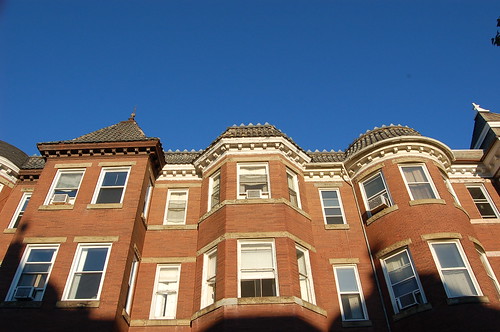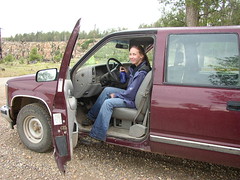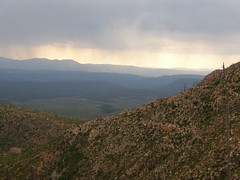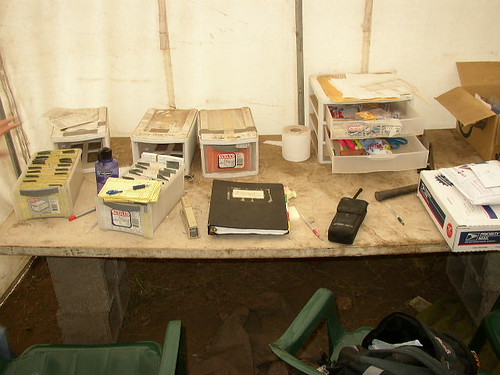…getting my head back in the game on Mondays was complicated by startlingly beautiful weather, weather better suited for strolling past well-tended Charles Village gardens or through a park, if you can find any in this green-space challenged city. Nonetheless, I finished making text edits to that immense paper I’ve been struggling with and left work with a not entirely unwarranted feeling that it had been a productive day.
On the way home, I stopped at Eddie’s, a small grocery store in Charles Village, for three items I’d forgotten to place on Saturday’s Safeway.com order. The Giant is closer to my house than Eddie’s, and presumably cheaper (although I haven’t studied this), but Eddie’s is always my preference if I need some groceries on my way home from work because I’m inevitably carrying a bag or briefcase, and Giant insists on treating its customers like criminals by requiring everyone to check their bags on the way in. Unless you’re a woman, of course.
Once, I entered the Giant carrying an expensive camera in a small cooler bag (cheaper than and not as obvious as an actual camera bag), and I strode right past the guard without thinking, because it would never have occurred to me to check this bag. “Sir! SIR!” The guard chased me into the store. “You need to check your bag, sir.” I showed her that it only contained a camera (I might have had room to stuff in a few candy bars or packs of gums, certainly not as much as some neighborhood women with their massive tote-style purses could manage), assuming that she would immediately recognize that checking this bag was not an option. She insisted. A., who was with me, said something quite reasonable about how reluctant we were to entrust a camera to strangers, which seemed to really offend the guard, as if she were a knight of the realm, sworn to uphold justice and defend those who cannot defend themselves, rather than a rent-a-cop in a plastic shirt. And I’ve been a rent-a-cop in a plastic shirt, so it’s nothing against her, but come on, “grocery-store security guard” is not a calling, it’s a job. She eventually “let” me carry the camera around my neck, but I had to leave the cooler bag with her. I swore I would never return, but I turned out to be too weak to ignore a supermarket three hundred yards from my front door.
The problem, in addition to my resenting being assumed guilty on my way into a store where I spend about $80-100 every week, is that I’ve seen these “guards” wandering into the store, gabbing on cell phones, doing stretching exercises out on the sidewalk — anything but keeping a close watch on these checked bags, which are arrayed temptingly on a wire shelf just inside the entryway, within easy grabbing range of anyone passing by. And what if something happened in the store that caused a distraction and required the guard’s presence? Who would watch the bags then?
But mainly, it’s the being made to feel like a criminal that gets to me. Walking into the store behind an African-American man who was surprised to have to check his briefcase, I heard him exclaim to the passersby something like it’s a black neighborhood, so this is how they treat us. Exactly. Plus, the managers have to know that — as is the case throughout the retail industry — any significant shoplifting problems they are experiencing are much more likely to originate within their own staff, rather than crafty customers with tinfoil-lined duffel bags. (Um, I understand that’s one way to defeat those alarm sensors by the door.)
After Eddie’s, I picked up my drycleaning at the Mr. Nifty’s on Greenmount, which I mention not because I suspect it is particularly fascinating, but because being able to duck into stores on my way home — on foot — from work is an unusual luxury in this country, even in this city, where you really have to luck out to arrange work, grocery shopping and other necessities within a walkable radius of your home. This kind of human-scale convenience is what some people are already returning to the cities for (the rest will be back when the oil runs out), and it seems to me that we should make it a national goal to make this kind of lifestyle possible for as many people as we can. If you care about the environment, if you want to lessen our dependence on other people’s oil, if you just want a healthier life — all of these goals and more would be met if clean, functioning cities were a residence option for more of us.
And of course this is exactly the kind of thing I think I will miss most in Montana.
A. called around 7:30 p.m. (5:30 p.m. Arizona time). There is no cell phone reception at Bird Camp, which is located in dense forest among rolling hills, so, to check for messages on the official camp phone and keep up her own personal contact with the outside world, every day or so she must drive 20 minutes to the Mogollon Rim, at the southern edge of not only the Coconino National Forest but the entire Colorado Plateau. There on the Rim, where, on a clear day, you can see over 100 miles to the Four Peaks of the Mazatzal Mountains near Phoenix (during the summer, the Rim is a great spot for watching forest fires flare up off in the distance), she erects her antenna and boots up her satellite phone. (Just kidding. Verizon has the Rim covered.)
In last night’s call, A. reported that she had spent much of her day walking the fences of the other enclosures (yesterday I mentioned that one enclosure’s fence had been ruined by a treefall) and was relieved to find that the rest of them are in good shape. In the afternoon, she returned to camp and started preparing training aids that she will use to get all of her crew members on the same page when it comes to estimating horizontal and vertical distance. The project’s data records, as well as day-to-day operations in which some crew members will need to locate nests and natural features based on directions written down by other crew members, depend on everyone having the ability to accurately estimate distance. Her training aids consist of flags staked out along the ground at regular intervals, for estimating horizontal distance, and a rope hanging from a branch about 100 feet off the ground, marked every meter with bright orange surveyor’s tape. (Don’t worry, she didn’t climb up there. Instead, a rock tied to a smaller “messenger” line was thrown over the branch; this smaller line was then used to pull the larger rope into place.)
She also remembered to tell me about a problem that had come up just as she and the core members of the crew were arriving at camp for the first time: the company that held the porta-potty contract last year had, at the last moment, cancelled the contract for this year; a second company was only willing to step in at a monthly rate approximately double what the first company had originally charged for the entire season, which is business-speak for “we don’t really want this contract.” It’s hard to blame them. The nearest town, Happy Jack, consists of a general store and a cafe, and Bird Camp is about 40 minutes away from Happy Jack along gravel Forest Service roads. Not a lot of opportunity for economies of scale and that sort of thing. But fortunately the company had also notified the project’s main office back in Missoula, and the staff administrative assistant — one of those stolid, long-time career professionals that are the backbone of any university — had found a suitable replacement before A. even learned of the problem.
In other standard concerns for anyone responsible for human settlements since time immemorial, there is already a case of bronchitis in the camp; apparently there was a bit of an epidemic last year. I looked up bronchitis on Wikipedia just now, thinking I might be able to find some ideas about keeping it from spreading, and was reminded that it’s not exactly a disease, it’s a condition, i.e., inflammation of the bronchi that may be caused by a variety of bacteria and viruses. Apparently, irritated bronchi are particularly susceptible, which is why smokers so frequently suffer from it. I wondered if the dry, dusty conditions that arise in the camp once the summer heat starts to build might cause a general irritation of this sort. Then the germs — whatever they are – -have only to make short leaps from person to person in the communal eating tent, and before you know it the camp must raise a yellow flag and start burning everyone’s clothes. (Again, not really.)
But back to walking those fences. I’m finishing out my third straight year of working in an office, staring at a computer, and the vision of my wife, striding the hills like some sort of rancher, ruminatively plucking at fence wire with her rawhide-gloved finger, was incredibly romantic. I was overcome with jealousy and told A. how much I would love to have a paid reason to wander in the woods. She didn’t believe me at first. The weird thing is, I think that she believes that other people would find this kind of work boring (although she certainly doesn’t). Can you believe it?
Be honest. You’re positively quivering with envy right now.
I’m not trying to rub it in. I’m quivering, too, although I have also had a lot of coffee this morning.





